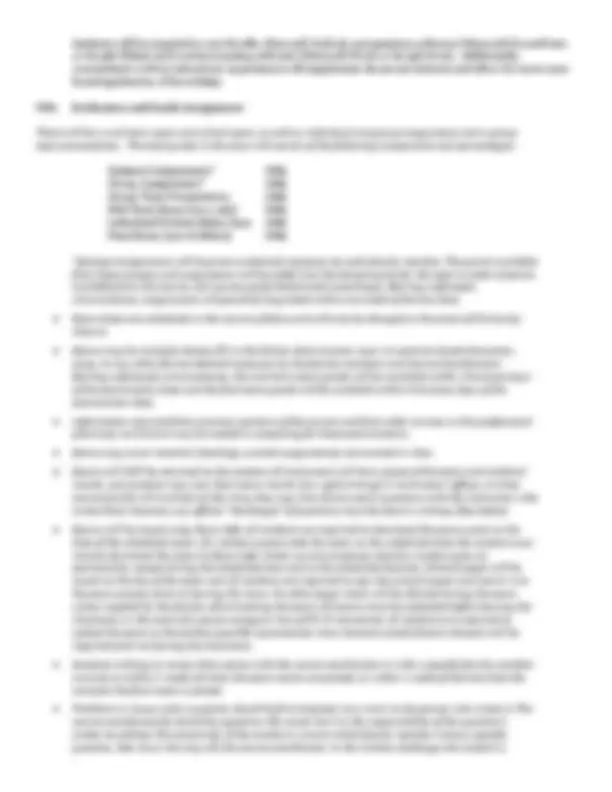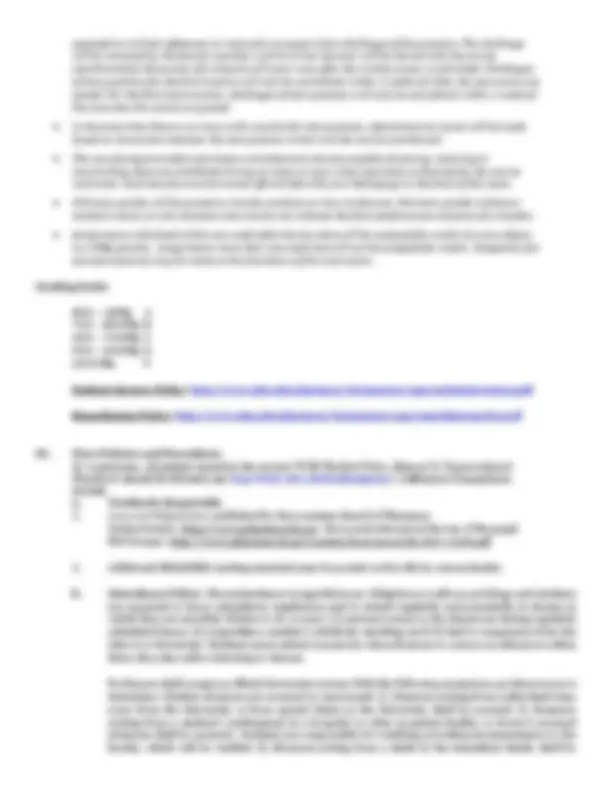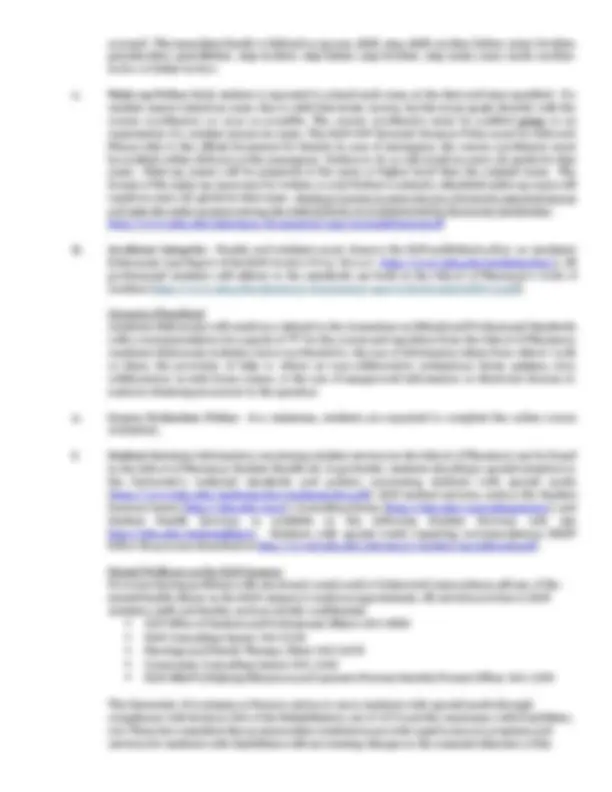





Study with the several resources on Docsity

Earn points by helping other students or get them with a premium plan


Prepare for your exams
Study with the several resources on Docsity

Earn points to download
Earn points by helping other students or get them with a premium plan
Community
Ask the community for help and clear up your study doubts
Discover the best universities in your country according to Docsity users
Free resources
Download our free guides on studying techniques, anxiety management strategies, and thesis advice from Docsity tutors
The course will cover Louisiana Pharmacy Law, ethical principles, ethical decision-making, professional values in pharmacy practice and contemporary ethical ...
Typology: Lecture notes
1 / 7

This page cannot be seen from the preview
Don't miss anything!




January 2021 Revision
I. Contact Information Course Coordinator: Scott Baggarly, RPh, MBA, PhD Phone: 318- 342 - 3020 Email: baggarly@ulm.edu Office Location: Bienville 261 Office Hours: virtual via Zoom appointments; see Moodle page Preferred Method of Communication: email Course Instructors: Jeffery D. Evans, PharmD Phone: 318- 342 - 1810 (Shreveport office); 318 - 342 - 1745 (Monroe office) Email: jevans@ulm.edu Office Location: Shreveport campus and Bienville 225 Office Hours: TBA Preferred Method of Communication: email II. Course Pre-requisites/Co-requisites Pre-requisites – P1 Status Co-requisites – None III. Course Description PHRD 4031. Pharmacy Practice Ethics and Law I. 2 cr. Distinguishes ethical from other kinds of issues in pharmacy, identifies options open to a pharmacist faced with an ethical issue. Students will be introduced to administrative law as it applies to the practice of pharmacy. IV. Curricular Objectives and Outcomes Domain 1 – Foundational Knowledge 1.1. Learner (Learner) - Develop, integrate, and apply knowledge from the foundational sciences (i.e., pharmaceutical , social/behavioral/administrative , and clinical sciences ) to evaluate the scientific literature, explain drug action, solve therapeutic problems, and advance population health and patient-centered care. Domain 2 – Essentials for Practice and Care 2.1. Patient-centered care (Caregiver) - Provide patient-centered care as the medication expert (collect and interpret evidence, prioritize, formulate assessments and recommendations, implement, monitor and adjust plans, and document activities). Domain 3 - Approach to Practice and Care 3.1. Problem Solving (Problem Solver) – Identify problems; explore and prioritize potential strategies; and design, implement, and evaluate a viable solution. 3.3. Patient Advocacy (Advocate) - Assure that patients’ best interests are represented.
Domain 4 – Personal and Professional Development 4.4. Professionalism (Professional) - Exhibit behaviors and values that are consistent with the trust given to the profession by patients, other healthcare providers, and society. ACPE APPENDIX 1 (Refer to Appendix at www.examsoft.com/ulmcop) Pharmacy Law and Regulatory Affairs Federal and appropriate state-specific statutes, regulations, policies, executive orders, and court decisions that regulate the practice of pharmacy, including the mitigation of prescription drug abuse and diversion. Ethics Exploration of approaches for resolving ethical dilemmas in patient care, with an emphasis on moral responsibility and the ability to critically evaluate viable options against the needs of patients and other key stakeholders. Cultural Awareness Exploration of the potential impact of cultural values, beliefs, and practices on patient care outcomes V. Course Specific Objectives and Outcomes At the conclusion of this course, students should be able to:
expected to include references or rationale to support their challenge of the question. The challenge will be reviewed by the faculty member, and his or her decision will be shared with the course coordinator(s). Discussion of a dispute will occur only after the written query is submitted. Challenges of test questions for the first 4 exams will only be considered within 2 weeks of when the test scores are posted. For the final examination, challenges of test questions will only be considered within 1 week of the time that the scores are posted.
excused. The immediate family is defined as spouse, child, step-child, mother, father, sister, brother, grandmother, grandfather, step-mother, step-father, step-brother, step-sister, aunt, uncle, mother- in-law or father-in-law. c. Make-up Policy: Each student is expected to attend each exam at the date and time specified. If a student cannot attend an exam due to valid University excuse, he/she must speak directly with the course coordinator, as soon as possible. The course coordinator must be notified prior to an examination if a student misses an exam. The ULM SOP Excused Absence Policy must be followed. Please refer to the official document for details. In case of emergency, the course coordinator must be notified within 48 hours of the emergency. Failure to do so will result in a zero (0) grade for that exam. Make-up exams will be prepared at the same or higher level than the original exam. The format of the make-up exam may be written or oral. Failure to attend a scheduled make-up exam will result in a zero (0) grade for that exam. Students missing an exam due to a University approved excuse will take the make-up exam during the week of finals, or as determined by the course coordinator. http://www.ulm.edu/pharmacy/documents/ospa/excusedabsence.pdf d. Academic Integrity: Faculty and students must observe the ULM published policy on Academic Dishonesty (see Page 4 of the ULM Student Policy Manual - http://www.ulm.edu/studentpolicy/). All professional students will adhere to the standards set forth in the School of Pharmacy’s Code of Conduct (http://www.ulm.edu/pharmacy/documents/ospa/codeofconductv82011.pdf). Censures (Penalties) Academic dishonesty will result in a referral to the Committee on Ethical and Professional Standards with a recommendation for a grade of “F” for the course and expulsion from the School of Pharmacy. Academic dishonesty includes, but is not limited to, the use of information taken from others’ work or ideas, the provision of help to others on non-collaborative evaluations (tests, quizzes, etc.), collaboration on take home exams, or the use of unapproved information or electronic devices to assist in obtaining an answer to the question e. Course Evaluation Policy: At a minimum, students are expected to complete the online course evaluation. f. Student Services: Information concerning student services in the School of Pharmacy can be found in the School of Pharmacy Student Handbook. In particular, students should pay special attention to the University’s technical standards and policies concerning students with special needs (http://www.ulm.edu/studentpolicy/studentpolicy.pdf). ULM student services, such as the Student Success Center (http://ulm.edu/cass/), Counseling Center (http://ulm.edu/counselingcenter/), and Student Health Services, is available at the following Student Services web site http://ulm.edu/studentaffairs/. Students with special needs requiring accommodations MUST follow the process described at http://rxweb.ulm.edu/pharmacy/student/specialneeds.pdf. Mental Wellness on the ULM Campus If you are having problems with emotional, social, and/or behavioral issues please call any of the mental health clinics on the ULM campus to make an appointment. All services are free to ULM students, staff, and faculty, and are strictly confidential.
XI. PHRD 4031 Tentative Course Schedule – The instructors reserve the right to adjust the schedule as needed. Jan 11 Introduction to the class and Law Pharmacists, Pharmacy Interns, and Pharmacy Technicians Jan 18 NO CLASS – Martin Luther King Holiday Jan 25 Chapter 25: Prescriptions, Drugs, and Devices Feb 1 Chapter 27: Controlled Dangerous Substances Feb 8 Chapter 27: Controlled Dangerous Substances, cont. Feb 15 NO CLASS - Mardi Gras Holiday Feb 22 Chapters 11, 12, 13, 15, 17 – Pharmacy rules Mar 1 Chapters 11, 12, 13, 15, 17, cont.; Pharmacy closure; Principles of patient counseling Mar 8 Introduction to Ethics; Professional values in Pharmacy Practice; Foundations of Ethical Decision-making Mar 15 Mid-Term Exam (LAW ONLY) Mar 22 A Framework for Ethical Decision-making in Pharmacy Practice The Pharmacist-Patient Relationship Mar 29 HIPPA introduction; End of life dilemmas; Ethical Considerations in Professional Communication Apr 5 NO CLASS - Spring Break Apr 12 Contemporary Issues in Healthcare Ethics Apr 19 Contemporary Issues in Healthcare Ethics Apr 26 Contemporary Issues in Healthcare Ethics; Review; Individual Written Cases May 3 Law and regulation update May 14 (Friday) - Final, 9:00 a.m. (Topics from both Law and Ethics)